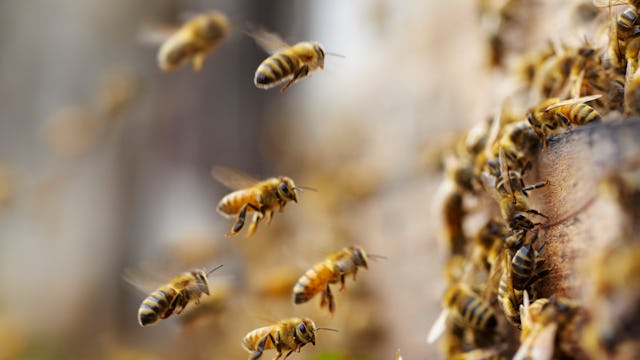Roundup Weed Killer Might Be Responsible For Killing Off Bee Populations

Ingredient in Roundup might be the reason some populations of bees are dying off
Earlier this summer, we found out that an ingredient in the weed killer Roundup was found in some popular breakfast cereals, and had also been linked to causing cancer in over 4,000 people. Now, the product is in the news again after a study discovered that the ingredient might be partly responsible for widespread bee deaths all over the world.
Scientists at the University of Texas at Austin say it’s the glyphosate contained in Roundup that could be causing bees to die off. Glyphosate, the active ingredient found in the popular herbicide, destroys specialized gut bacteria in bees, which makes them more vulnerable to infection-causing bacteria — which could lead to their deaths.
The University’s researchers, Nancy Moran, Erick Motta, and Kasie Raymann, feel that their findings point to glyphosate as a possible factor in colony collapse disorder, which has caused devastation in honey bees and native bees for over a decade.
The scientists are sharing their findings in hopes that it will help people (particularly, farmers, landscapers, and home owners who spray their yards) to understand how harmful glyphosate-based herbicides can be for bees. When sprayed on flowering plants that bees pollinate, it can be very dangerous to the hive.
Motta led the study and his thoughts are that the current guidelines for weed killer are inaccurate. “We need better guidelines for glyphosate use, especially regarding bee exposure, because right now the guidelines assume bees are not harmed by the herbicide,” he says. “Our study shows that’s not true.”
The research involved exposing bees to glyphosate in levels that could be found in crops, yards, and roadsides. The bees were marked with paint so they could be tracked and recaptured days later to measure healthy gut microbiota, which was found to be reduced in bees exposed to the glyphosate. In fact, of eight species of gut bacteria found in bees, four were found in lesser amounts after exposure to the glyphosate.
Moran says, “Studies in humans, bees and other animals have shown that the gut microbiome is a stable community that resists infection by opportunistic invaders. So if you disrupt the normal, stable community, you are more susceptible to this invasion of pathogens.”
In other words, this ingredient is making it much easier for whole hives of bees to get sick and die off.
It was over 10 years ago that beekeepers were seeing hives ruined by colony collapse disorder with millions of bees disappearing, which meant crops weren’t being pollinated. Herbicides were among the possible causes and this research helps solidify that hypothesis.
Bayer, the company that owns Monsanto (which is the company that developed Roundup) disputes the research saying, “No large-scale study has ever found a link between glyphosate and honey bee health issues.” They claim the University’s new study “does not change that.”
Motta concludes, “It’s not the only thing causing all these bee deaths, but it is definitely something people should worry about because glyphosate is used everywhere.”
This article was originally published on